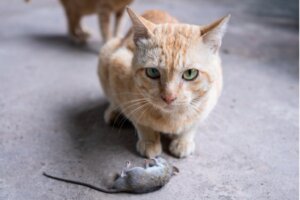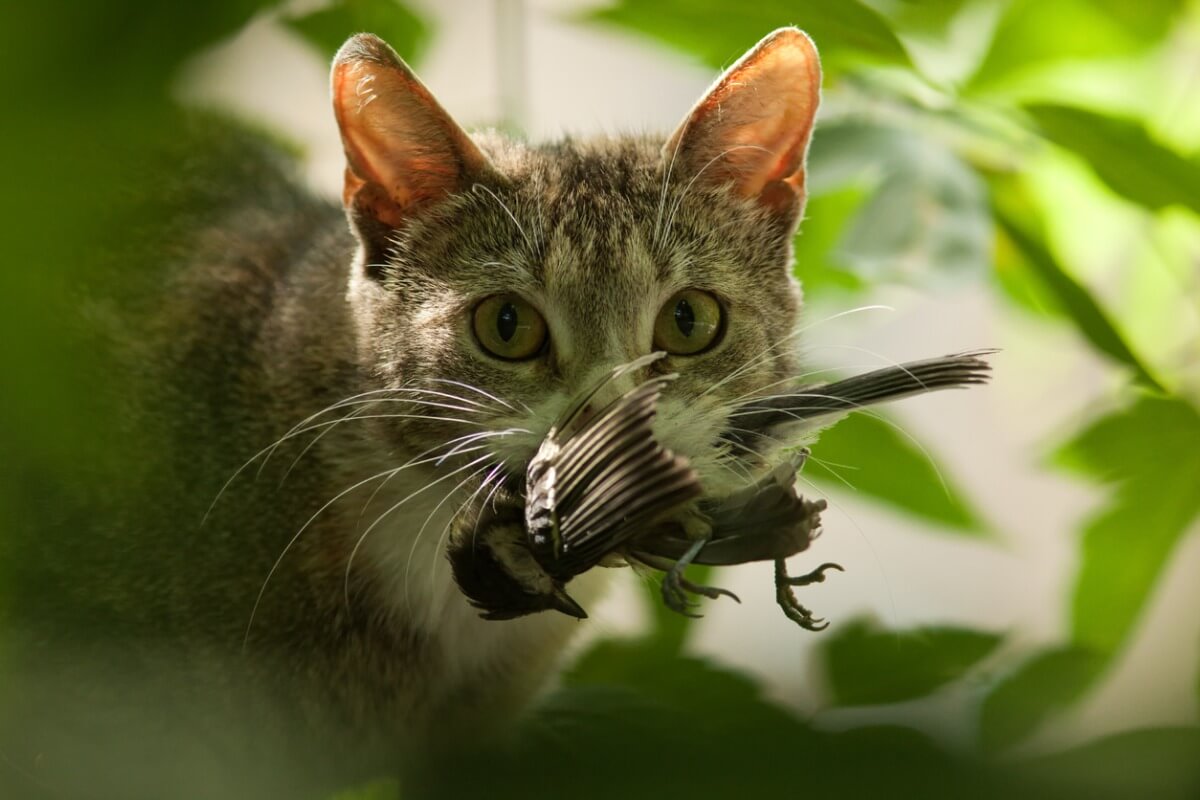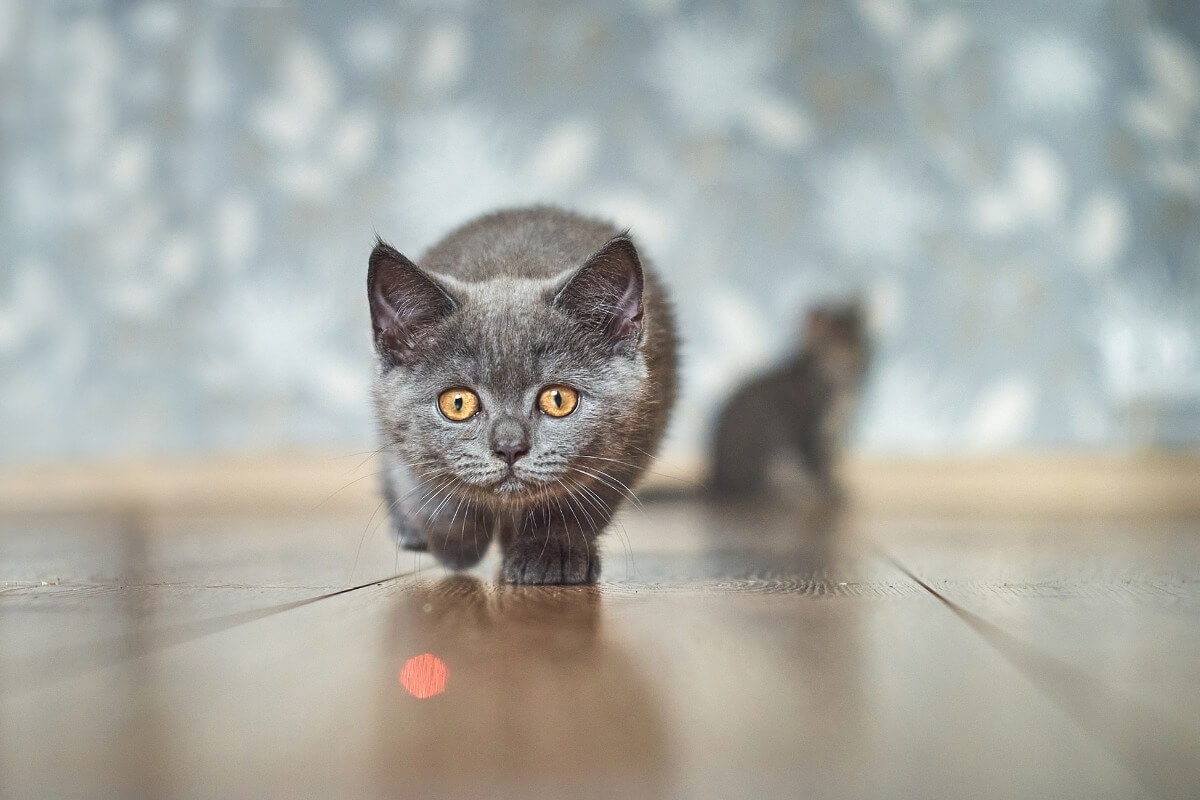Why Does Your Cat Bring You Dead Animals?


Reviewed and approved by the biologist Samuel Sanchez
If you live with a cat, chances are they’ve brought one of their prey home with them, but why does your cat bring dead animals to you? Some cats put them at their owner’s feet and others even leave them on top of their beds, which can be extremely unpleasant.
One thing is certain, and that is that cats are efficient predators by nature. They can’t help but hunt, something they show when they grab your feet or your hands when you least suspect it. However, this can also have implications for the conservation of endangered species. Find out why your cat brings you dead animals in this article.
Does your cat carry dead animals to you?
Experts from Cats Protection experts say that it was once believed that a feline brought dead animals into the house as a gift to its owners. However, in reality, it’s because the feline prefers to move prey into its territory (which is usually the house). There your cat feels safe and can leave the food to feed on it later.
This is a natural instinct in all felines, so it’s impossible to stop it. Even if your cat doesn’t hunt (because they may live indoors), they have the capacity to do so. This behavior is always present, because it’s encoded in the genome of the species. A cat is, and always will be, a predator.

Why do domestic cats hunt?
It’s very common for cat owners to wonder why their cat continues to hunt if they’re supplying it with good quality food. Well, as we already mentioned, it’s because the domestic cat is a predatory species. Its natural instinct is to hunt for food.
Like their wild ancestors, the kittens are specialized solitary hunters. Until fairly recent times these animals were regarded as pest controllers rather than companions.
In addition, domestic felines are still carnivores, so they literally can’t live without animal fat or protein. Since cats hunt alone, their prey are small mammals and birds, as this is all they’re capable of catching on their own.
Because of the small size of their prey, they need to hunt mice several times during a 24-hour period to meet their daily energy needs. In fact, a cat that has no supplemental food may make 10 to 20 catches per day. As a result of this natural feeding pattern, they’ve adapted to eating small amounts of food frequently.
So, kittens are specifically accustomed to hunting for live food, but they can also accommodate other alternative sources (such as the food you provide or food found in the garbage). However, if cats have the opportunity to hunt, they won’t hesitate to do so.
Why keep your cat from bringing dead animals to you?
If you let a cat out of the house, they’ll eventually do what comes naturally to them. Professional studies claim that domestic cats (Felis catus) are predators that humans have introduced globally and have been listed among the 100 most harmful invasive species that aren’t native to their environment worldwide.
Free-ranging cats on islands have contributed to some 33 modern extinctions of birds, mammals, and reptiles recorded by the International Union for Conservation of Nature (IUCN) Red List, accounting for 14% of the total. The figure for mainland areas isn’t as high, but it’s still alarming.
The studies cited estimate that cats in the United States kill between 1.3 and 4 billion birds a year and that approximately 69% of this mortality rate is caused by unowned cats. This finding shows us how important it is to take action in this regard.
By taking steps to control your feline’s hunting, you can help conserve all the wildlife that’s being lost.
How do you prevent your cat from bringing dead animals to you?
If you want to reduce your cat’s hunting to a great extent (or at all), you can do so with the following options. The key is to give your feline the right alternatives:
- Keep your cat indoors, especially at dawn and dusk, when their prey is most active. Some indoor cats live very happily indoors, especially when they have the proper environmental enrichment.
- Put a collar with a bell around your pet’s neck so their prey will hear them when they approach.
- Provide interactive play sessions with fishing pole toys, pretending that they are the prey. Felines need this type of environmental enrichment for mental and physical health, as hunting is part of their nature.
- International Cat Care says that stuffing your cat with food will make them hunt more, as the appetite increases their level of enthusiasm for this activity. Check with your vet about the right amount of food your cat needs.

We’re sure that your cat is a lovely companion that fills you with happiness, but, because of the effects of hunting, cat owners need to be conscious about reducing the environmental impact of putting so many wild animals in danger.
All cited sources were thoroughly reviewed by our team to ensure their quality, reliability, currency, and validity. The bibliography of this article was considered reliable and of academic or scientific accuracy.
- Cats Protection. (2017, 4 octubre). «Why is my cat bringing in mice?» and other behaviour FAQs. Recuperado 24 de octubre de 2021, de https://www.cats.org.uk/cats-blog/why-does-my-cat-bring-in-mice
- International Cat Care. (2019, 6 octubre). Why do cats bring home dead prey? Recuperado 24 de octubre de 2021, de https://icatcare.org/advice/why-do-cats-bring-home-dead-prey/
- Loss, S. R. (2013, 12 diciembre). The impact of free-ranging domestic cats on. . . Nature Communications. Recuperado 24 de octubre de 2021, de https://www.nature.com/articles/ncomms2380?error=cookies_not_supported&code=e7f1ab0b-c0c2-4c03-9ad0-5ddae047decf
- RSPCA. (2018, 9 noviembre). How can I reduce or prevent my cat from hunting prey? Recuperado 24 de octubre de 2021, de https://kb.rspca.org.au/knowledge-base/how-can-i-reduce-or-prevent-my-cat-from-hunting-prey/
Scource, B. (2019, 4 febrero). Understanding the hunting behaviour of cats. International Cat Care. Recuperado 24 de octubre de 2021, de https://icatcare.org/understanding-the-hunting-behaviour-of-pet-cats-an-introduction/
This text is provided for informational purposes only and does not replace consultation with a professional. If in doubt, consult your specialist.